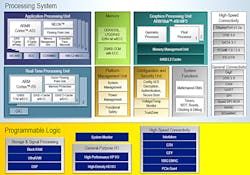Baidu’s Apollo is an ambitious, open-source platform designed to support self-driving vehicles. Apollo Enterprise, initially released at last year’s Consumer Electronics Show, targets highway autonomous driving, autonomous valet parking, and fully autonomous mini-buses. It includes an intelligent map data service platform and Baidu’s voice assistant for cars, DuerOS.
Of course, the software framework needs to run on something, which is the Apollo Computing Unit (ACU). Baidu and Xilinx just announced that Apollo is running on the Xilinx Automotive (XA) Zynq UltraScale+ MPSoC (XAZU5EV) (see figure). The 16-nm FinFET+ XA Zinq UltraScale+ MPSoC is an automotive-qualified FPGA that targets advanced driver-assistance systems (ADAS) and self-driving cars. It incorporates 64-bit, hard-core Arm processors with an FPGA fabric that contains over 650,000 programmable logic cells and nearly 3,000 DSP slices.
Apollo’s deep-learning inference support is designed to handle complex driving environments, including sensor fusion and AI processing. The Apollo proof-of-concept hardware platform uses GPUs—this is replaced with the Xilinx hardware. The new hardware is compatible with the existing Baidu PaddlePaddle framework that incorporates five cameras and a dozen ultrasonic radars. The system is designed to meet vehicle-level production requirements.
“Through our close collaboration with Xilinx, we are providing automotive OEMs and Tier 1 suppliers with an adaptable computing platform,” said Wang Yunpeng, senior director of Baidu's Automatic Driving Technology Department. “The Xilinx technology is at the heart of our ACU-Advanced platform for AVP, as no other solution could provide us with the performance required for mass production.”
“Baidu is increasingly a major player in automotive, and Xilinx is the ideal solution to solve the technical challenges associated with AVP and automated vehicle development," said Yousef Khalilollahi, vice president, core vertical markets, Xilinx. "By providing an adaptable hardware platform, Baidu can design flexible and scalable systems that seamlessly incorporate AI compute acceleration and functional safety through diversity in processing engines. We look forward to expanding our collaboration with Baidu to take automated driving to the next level.”
Baidu’s announcement also noted that its Automated Valet Parking (AVP) runs on ACU-Advanced and Xilinx’s hardware. AVP is built on Apollo.


